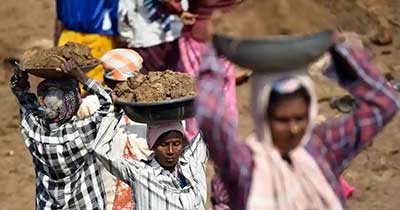Date: 31/01/2023
Relevance: GS-2: Government policies and interventions for development in various sectors and issues arising out of their design and implementation.
Key Phrases: MGNREGA, Central Employment Guarantee Councils, reforms, Rural Development, regressive, forced labour, Economic Survey, Management Information System, demand-based law.
Context:
- The Mahatma Gandhi National Rural Employment Guarantee Act (MGNREGA) is no stranger to reform.
- The zeal with which reforms are introduced often outpaces the capacity to adapt.
- Every time the administrative system gets back on its feet after a reform movement, it is hit by another.
- Poorer States struggle more to adapt when compared to those that are better off because of weaker administrative capacity.
Key Highlights:
- The most recent concern of the central government is over the programme’s “regressive” spending pattern, where poorer States spend less NREGA funds than better-off ones.
- A committee to suggest reforms has been constituted instead of listening to the long-standing demands of workers and their collectives.
- NREGA is underperforming because its most basic design principles have been forgotten or wilfully ignored.
Mahatma Gandhi National Rural Employment Guarantee Scheme (MGNREGA)
- MGNREGA is one of the largest work guarantee programmes in the world.
- The primary objective of the scheme is to guarantee 100 days of employment in every financial year to adult members of any rural household willing to do public work-related unskilled manual work.
Salient features of the scheme:
- Right to Work is a statutory right.
- Wages must be paid according to the statutory minimum wages specified by States.
- Demand-Driven and legally-backed guarantee for any rural adult to get work within 15 days, if failed then ‘unemployment allowance’ should be given.
- Act promotes decentralisation with significant role to PRI in planning and implementation.
- Social Audit of MGNREGA works is mandatory, which lends to accountability and transparency.
- The Gram Sabha is the principal forum for wage seekers to raise their voices and make demands.
- It is the Gram Sabha and the Gram Panchayat which approves the shelf of works under MGNREGA and fix their priority.
Issues within MGNREGA:
- Paucity of funds disrupts demand-supply cycle of employment. Lack of funds results in suppression of demand for work and also constrains post covid rural economic recovery.
- Inefficiencies and unholy nexus of PRI with officials create hurdles in proper implementation of scheme e.g., Duplication of Job Cards.
- Phenomenon of low quality and high Inefficiency in work leading to poor asset creation in rural economy.
- Corrupt practices of ill-distribution of pay to workers, creation of fake bills, delay in payments, scamming of funds had entered NREGA long back which led to the epic failure and criticism of the scheme by the government.
- Insufficient support: With the unemployment rate reaching a 45-year high at 6%, giving merely 100 days of employment is not sufficient.
- Ineffective Role of PRI: With very little autonomy, gram panchayats are not able to implement this act in an effective and efficient manner.
Measures Needed to Tackle the Issues:
- Address delays in Wage Payments
- To address delays in wage payments to restore the faith of workers in the programme.
- In 2016, the Supreme Court of India directed the government to ensure that wages were paid on time, calling the act of making workers wait for wages for months equal to “forced labour”.
- The Ministry of Rural Development must simplify the payment process and has to be transparent about pending wage payments in stages one and two so that bottlenecks can be corrected.
- Strengthen Implementation Capacities
- To strengthen implementation capacities where expenditure is low instead of curbing expenditure where employment generation is high.
- States which are spending more are implementing the programme better because they have better capacities (as several studies including the government’s own Economic Survey concluded in 2016).
- For a universal, demand-based social security programme such as NREGA, reforms cannot be based on ‘targetting’ better.
- There has to be a focus on exclusion and not inclusion “errors”.
- Run programs like a Demand-Based Law
- To run the programme like a demand-based law, and not a scheme. Intermittent and unpredictable fund released by the central government is one of the fundamental reasons why State governments are unable to ensure the full potential of NREGA.
- As of today, ₹18,191 crore in liabilities is due to 24 States.
- Poor-performing States, on account of inadequate funds, typically discourage and often deny the demand for work.
- Make Discussions on any Proposed reforms Participatory:
- There is a need to make discussions on any proposed reforms participatory.
- NREGA emerged from the demands of a vibrant peoples’ movement across India and its cornerstones have been its path-breaking provisions for public accountability.
- State governments have played a pivotal role in the successes and failures of NREGA, and any proposed reforms must be tabled in State assemblies in addition to Parliament along with bringing civil society organisations, worker unions and representatives of self-help groups into the discussion.
- Map the Impact of Each of its “Reforms”:
- It is time the Government of India makes an earnest attempt to map the impact of each of its “reforms” on access to and the expenditure of NREGA, particularly in poorer States.
Conclusion:
- Reforms to NREGA must prioritise the access of workers to entitlements with ease and dignity, rather than focus on administrative and fiscal efficacy alone.
Source: The Hindu
Mains Question:
Q. State governments have played a pivotal role in the successes and failures of NREGA, and any proposed reforms must be tabled in State assemblies in addition to Parliament. Discuss (250 Words)







